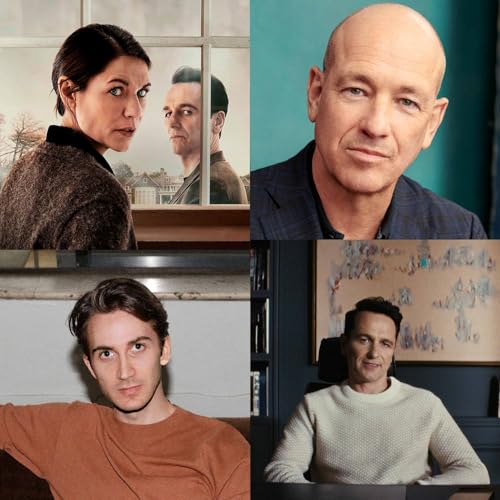
Film & TV, The Creative Process: Acting, Directing, Writing, Cinematography, Producers, Composers, Costume Design, Talk Art & Creativity
Échec de l'ajout au panier.
Échec de l'ajout à la liste d'envies.
Échec de la suppression de la liste d’envies.
Échec du suivi du balado
Ne plus suivre le balado a échoué
-
Narrateur(s):
À propos de cet audio
Film & TV episodes of the popular The Creative Process podcast. We speak to actors, directors, writers, cinematographers & variety of behind the scenes creatives about their work and how they forged their creative careers. To listen to ALL arts & creativity episodes of “The Creative Process · Arts, Culture & Society”, you’ll find our main podcast on Apple: tinyurl.com/thecreativepod, Spotify: tinyurl.com/thecreativespotify, or wherever you get your podcasts!
Exploring the fascinating minds of creative people. Conversations with writers, artists & creative thinkers across the Arts & STEM. We discuss their life, work & artistic practice. Winners of Oscar, Emmy, Tony, Pulitzer, leaders & public figures share real experiences & offer valuable insights. Notable guests and organizations include: David Rubin (Academy of Motion Picture Arts & Sciences), Neil Patrick Harris, Matthew Libatique (A Star is Born, Black Swan), Martin Ruhe (The Midnight Sky), Alice Brooks (In the Heights), Jack Thorne (Harry Potter & the Cursed Child), George Pelecanos (The Wire, The Deuce), Neil Gaiman (American Gods), Alan Edward Bell (The Hunger Games), David Hollander (Ray Donovan), Marian Macgowan (The Great), Paul Hirsch (Star Wars, Mission Impossible), Morgan Neville (20 Feet from Stardom), Carter Burwell (Carol, Twilight), Joe Mantegna, Robert Nathan (Law & Order, ER), Jane Alexander, John Powell (Solo: A Star Wars Story, The Bourne films), Stuart Dryburgh (The Piano), Amy Aniobi (Insecure), Salvador Pérez (President Costume Designers Guild, The Mindy Project), Cindy Chupack (Sex & the City, Modern Family), Daniel Handler a.k.a. Lemony Snicket (A Series of Unfortunate Events), Howard Rodman (Sundance Institute, Fmr. President Writers Guild of America West), Tom Perrotta (The Leftovers, Mrs. Fletcher), Marcelo Zarvos (Wonder, Fences), Delia Ephron (You’ve Got Mail), Ian Seabrook (Jungle Cruise, Batman v Superman), Tema Staig & Allison Vanore (Women in Media), Caroline Thompson (Edward Scissorhands), Jordan Kerner (Charlotte’s Web, Fried Green Tomatoes), Jonathan Furmanski (Search Party), Benh Zeitlin (Beasts of the Southern Wild), Harris Yulin, Denson Baker (Get Out), François Clemmons (Mister Rogers’ Neighborhood), James McDaniel (NYPD Blue), Trish Sie (Pitch Perfect 3), Peter Weller, Alan Jacobsen (The Lonliest Whale), Michael Maren (Shriver), Albert Serra (Last days of Louis XIV), Ante Cheng & Matthew Chuang (Blue Bayou), John Matysiak (Old Henry), Josh Pais, Linh Nga (Inside this Peace), among others.
The interviews are hosted by founder and creative educator Mia Funk with the participation of students, universities, and collaborators from around the world. These conversations are also part of our traveling exhibition. www.creativeprocess.info
For The Creative Process podcasts from Seasons 1 & 2, visit: tinyurl.com/creativepod or creativeprocess.info/interviews-page-1, which has our complete directory of interviews, transcripts, artworks, and details about ways to get involved.
INSTAGRAM @creativeprocesspodcast
-
 Nov 17 202513 min
Nov 17 202513 minÉchec de l'ajout au panier.
Veuillez réessayer plus tardÉchec de l'ajout à la liste d'envies.
Veuillez réessayer plus tardÉchec de la suppression de la liste d’envies.
Veuillez réessayer plus tardÉchec du suivi du balado
Ne plus suivre le balado a échoué
-
 Nov 17 202551 min
Nov 17 202551 minÉchec de l'ajout au panier.
Veuillez réessayer plus tardÉchec de l'ajout à la liste d'envies.
Veuillez réessayer plus tardÉchec de la suppression de la liste d’envies.
Veuillez réessayer plus tardÉchec du suivi du balado
Ne plus suivre le balado a échoué
-
 Nov 9 202518 min
Nov 9 202518 minÉchec de l'ajout au panier.
Veuillez réessayer plus tardÉchec de l'ajout à la liste d'envies.
Veuillez réessayer plus tardÉchec de la suppression de la liste d’envies.
Veuillez réessayer plus tardÉchec du suivi du balado
Ne plus suivre le balado a échoué


